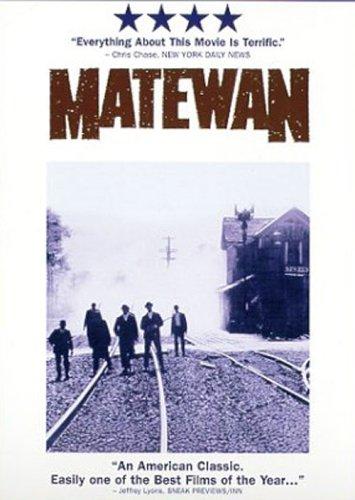A Labor Day Special!
DIRECTED BY JOHN SAYLES/1987
“Now, they got you fightin’ white against colored, native against foreign, hollow against hollow, when you know there ain’t but two sides to this world: them that work, and them that don’t. You work, they don’t. That’s all you got to know about the enemy.”
 Letter received in care of C.E. LIVELY (Bob Gunton), company spy for the Baldwin-Felts Detective Agency, on April 27th, 1920; Matewan, West Virginia…
Letter received in care of C.E. LIVELY (Bob Gunton), company spy for the Baldwin-Felts Detective Agency, on April 27th, 1920; Matewan, West Virginia…
Dear Mr. Lively,
Upon receipt of your letter of the 15th, have dispatched two trusted advisers, GRIGGS & HICKEY (Gordon Clapp, Kevin Tighe), who had some success quelling the aftermath of the Ludlow, Colorado disaster six years ago.
As operatives, I shall wish them to be apprised immediately upon arrival of the habits and daily routines of three individuals: Mayor CABELL TESTERMAN (Josh Mostel), Police Chief SID HATFIELD (David Strathairn), and the UNION ORGANIZER for the United Mine Workers (Chris Cooper).
I have been personally commissioned by the Stone Mountain Coal Company to use whatever means are at our organization’s disposal to deal with this potentially explosive labor dispute.
The mines must continue to deliver their daily tonnage unabated.
Cut off all three of the hydra’s heads, sir, and the querulous rabble will rapidly fold and collapse. You have my trust in this matter implicitly.
Sincerely,
THOMAS FELTS, Chief Special Agent; Roanoke, Virginia
…

John Sayles’ hard-scrabble 1987 historical production is a watershed movie for the independent film movement; a painstakingly-researched period piece about a little-known chapter in American history; and an admirably muted, though undeniably persuasive, portrait of popular progressivism. In short, it’s the very movie for which this day was made.
(*And, appropriately, the only way you can now see it is on a 14-year-old full-screen DVD replete with scratchlines, which render the pellucid images occasionally indistinguishable, and hissmarks, which render the limpid dialogue occasionally incoherent. I patiently await the fully-restored Criterion release complete with liner notes, documentaries, and a director’s/cinematographer’s commentary. Thank you.)
Detailing the formation and struggles of a motley Union of ‘native’ West Virginian miners, newly-arrived Italian-American immigrants, and African-American ‘replacement’ workers (the latter initially transported by the Company to work the mines as ‘scabs’), the film builds to a climactic moment of gunplay between the denizens of the town and the armed representatives of the mining company. It’s straight out of a Western, but here the victories and losses—with the events at Matewan (on May 19, 1920) leading to murky irreversibilities that would tragically persist through the decade—become less clear-cut.
…

Which is as it should be. In his distinctive 30 year career as ‘writer-director-editor,’ John Sayles is the very definition of an Uncompromising Filmmaker, consistently delivering movies whose artistic content—literate dialogue, indelible characters; with a sharp, almost documentarian’s eye and ear for time and place—has oft-been inseparable from their social and political content. Yes, Mr. Sayles definitely leans left, but it never feels like he’s giving you a dry history lesson or delivering some nauseatingly-biased diatribe. With Matewan, Mr. Sayles avoids the pitfalls of both revisionist and populist history epic-making by endeavoring to present a complex picture of how things are—or, rather, were—and letting his viewers make up their own minds.
Ably abetted in this vision by the great cinematographer Haskell Wexler (Days of Heaven, Bound for Glory), the accumulation of details against the authentic backdrop of the West Virginian mining hills—with its coal-dusted images of miners emerging from the deep caverns, or its feverishly-intense late night union meetings illuminated by lamplight—literally breathes with historical accuracy and truth. I’ve probably used the analogy before by now, but there are very few movies that can open a window before one’s eyes and make the past feel real, immediate, and vivid; like one could step right through the screen and live right there in an entirely different time and an extremely remote place. Matewan is one of those few movies.
…

Okay, so the dust clears on that climactic gunfight and, on one side, the mining town’s mayor, along with two miners, lie gutshot and dying; on the other, four mining company agents, including two brothers of the agency’s founders, have their heads blown apart on the town’s thoroughfare, and three more have their brains spewed out on the rails leading out of town. Reprisals will be swift and imminent, and the region will continue to be a bloodfield for many years to come…
The right to organize, much less a living wage for equal work, will be years away, but a federally-mandated 3-day weekend on the first week of September, a product entirely of the nation’s trade unions, had been officially on the books since 1894. Likewise, the right not to work on this day remains symbolic of the hard-earned struggles of those in the American labor movement.
Well, except for those working in retail, that is…
And with that on this fine fine morning, I bid you a fine fine shopping day!
Seeya at work.

